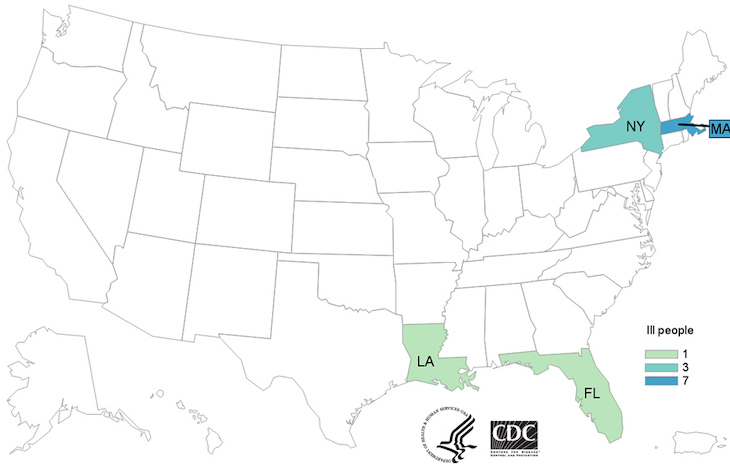The deadly deli meat Listeria monocytogenes outbreak has ended with 12 cases in 4 states, according to the Centers for Disease Control and Prevention (CDC). One person who lived in Florida died. A specific type of deli meat or a common supplier was not identified in the investigation.

The case count by state is: Florida (1), Louisiana (1), Massachusetts (7) and New York (3). All twelve patients were hospitalized. The patient age range was from 40 to 89 years. Illness onset dates ranged from August 6, 2020 to October 30, 2020.
Public health investigations used the PulseNet system to find people who were part of this outbreak. Whole genome sequencing was conducted on patient isolates. That genotyping showed that bacteria isolated from patients was closely related genetically, which means that people in this outbreak were more likely to share a common source of infection.
State and local health officials interviewed ill persons who were part of this deadly deli meat Listeria monocytogenes outbreak about the foods they ate the month before they got sick. Of the eleven people interviewed, all said they ate Italian-style deli meats such as salami, prosciutto, and mortadella. They bought prepackaged deli meats and meats that were sliced at deli counters in different locations.
USDA and state officials reviewed records collected from stores where ill people purchased deli meats to try to find a common supplier. They also tested deli meat products. But, they did not find a common supplier or specific type of deli meat that caused this outbreak.
Deli meats are risky for people who are in high risk populations. If you are pregnant, over 65, or have a weakened immune system because of a chronic illness such as diabetes or kidney disease, do not eat deli meats unless they have been heated to and internal temperature of 165°F. That will kill bacteria.

If you or a loved one have been diagnosed with a Listeria monocytogenes infection, please contact our experienced attorneys for help at 1-888-377-8900 or 612-338-0202.




